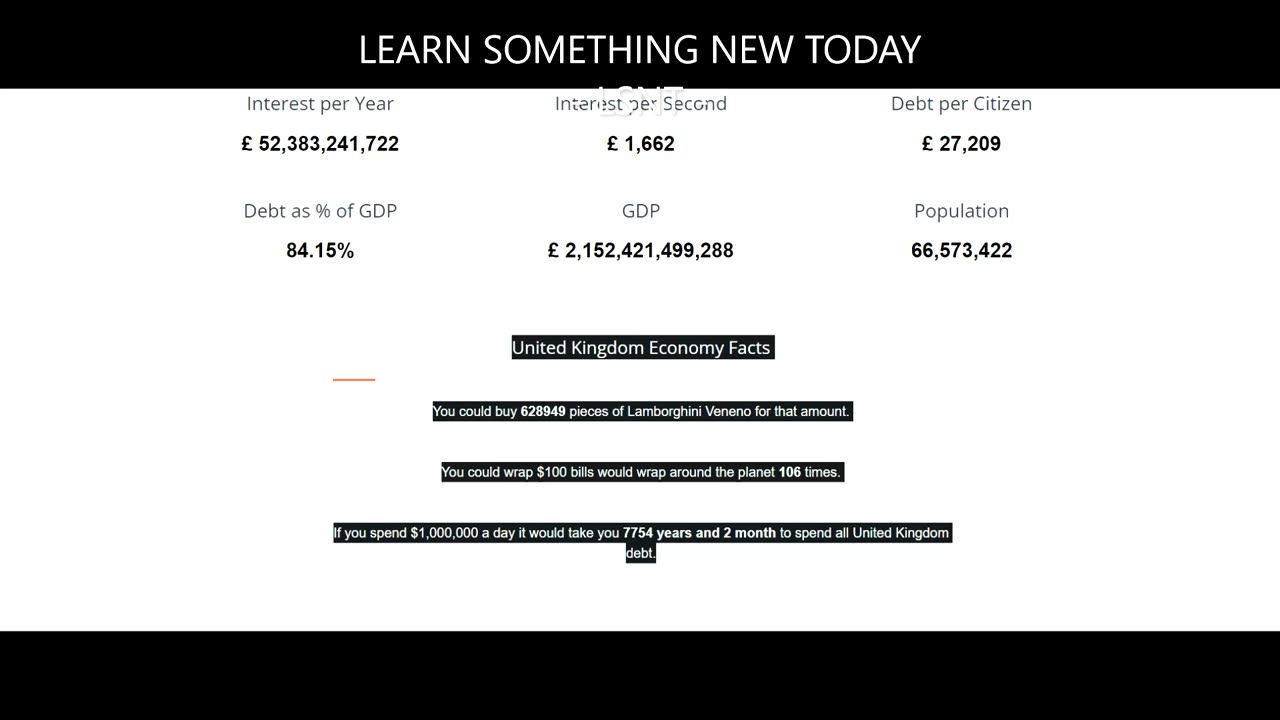Premium Only Content

The World Is In Debt! But To Whom?
Question Asked : The worldwide debt clock do you know who all the money is owed to? " FOR ENTERTAINMENT PURPOSE ONLY"
The concept of global debt can be complicated because it involves a combination of national, corporate, and individual debts. When you ask "who all the money is owed to," it depends on the type of debt:
1. Government (Sovereign) Debt
Bondholders: Countries issue bonds (IOUs) to finance their operations. These bonds are bought by:
Domestic institutions: Banks, pension funds, insurance companies, etc.
Foreign governments or institutions: Some countries (like the U.S., Japan, and China) hold significant portions of other countries' debt. For example, China and Japan are two of the largest holders of U.S. Treasury bonds.
Private investors: Individual and institutional investors also buy government bonds.
2. Corporate Debt
Banks and Lenders: Companies often borrow money from banks and other financial institutions.
Bondholders: Just like governments, companies also issue bonds to raise money, and these are bought by investors (both domestic and foreign).
3. Household Debt
Banks and Lenders: Individuals owe money to banks, credit unions, and other financial institutions for mortgages, credit cards, student loans, and personal loans.
Breakdown of Global Debt
Global debt is estimated to be over $300 trillion as of 2024. This includes both public and private debts, and the creditors are spread across different sectors:
Central Banks and Governments: Hold debts of other countries.
Financial Institutions: Banks and lending institutions hold large portions of corporate and household debt.
International Institutions: Entities like the International Monetary Fund (IMF) and World Bank provide loans to countries, particularly developing ones.
In essence, global debt is owed to a wide range of creditors, from large financial institutions to individual investors across various nations. The money circulates through a global system of lending, investment, and trade.
WHO CONTROLS THE GLOBAL DEBT?
Global debt is not controlled by a single entity, but rather by a complex network of institutions, governments, financial markets, and investors. Control over global debt is distributed among different stakeholders who influence how debt is issued, managed, and repaid. Here's a breakdown of the key players:
1. Governments and Central Banks
Governments: National governments issue sovereign debt (bonds) to fund their operations and deficits. Governments control their own borrowing to a large extent, but their ability to borrow depends on factors like creditworthiness, fiscal policy, and investor confidence.
Central Banks: Central banks, like the U.S. Federal Reserve or the European Central Bank (ECB), have significant influence over debt through their control of monetary policy. They can affect interest rates, the money supply, and inflation, all of which impact the cost of borrowing. Central banks also hold significant amounts of their own country’s and other countries’ debt through foreign exchange reserves and quantitative easing (QE) programs.
2. Private Financial Institutions
Banks and Investment Firms: Large international banks and investment firms play a crucial role in the global debt market by buying and selling debt securities (such as bonds). These institutions act as intermediaries, facilitating the issuance and trading of debt. They influence debt markets through lending and investment decisions.
Pension Funds and Insurance Companies: These institutional investors control significant amounts of capital and often invest in government and corporate bonds to secure long-term returns. They are major players in the global debt markets.
3. International Financial Institutions
International Monetary Fund (IMF): The IMF provides loans to countries, particularly developing nations, often in exchange for implementing specific economic reforms. The IMF has considerable influence over the debt situations of countries in financial distress because it provides funding during crises and monitors countries’ economic policies.
World Bank: Like the IMF, the World Bank lends money to developing countries for long-term development projects. Its goal is to reduce poverty, and it often finances infrastructure and social programs, influencing debt at a national level.
Bank for International Settlements (BIS): The BIS acts as a bank for central banks and supports international monetary and financial cooperation. While it doesn’t directly control debt, it influences global financial stability by promoting sound banking practices.
4. International Credit Rating Agencies
Credit Rating Agencies (CRAs): Agencies like Moody’s, Standard & Poor’s (S&P), and Fitch provide credit ratings for governments and corporations. Their ratings influence the perceived risk of lending to a particular country or company, which directly affects the interest rates that borrowers must pay. Higher credit ratings make it easier for entities to borrow, while lower ratings increase borrowing costs.
5. Bondholders and Investors
Institutional Investors: Large institutional investors (pension funds, hedge funds, sovereign wealth funds) hold a significant portion of global debt in the form of bonds. They control part of the global debt market by deciding where and when to invest, which affects interest rates and the flow of capital.
Foreign Governments: Countries like China and Japan hold large amounts of other nations' debt, especially U.S. Treasury bonds. This gives these governments a measure of influence over the debt market.
6. Multilateral and Regional Financial Institutions
European Central Bank (ECB): The ECB plays a major role in managing and stabilizing the debt of Eurozone countries. It conducts monetary policy for the entire Eurozone and can buy government debt through QE programs.
Development Banks: Regional development banks like the Asian Development Bank (ADB) or African Development Bank also lend to governments for specific projects, influencing regional debt dynamics.
7. Financial Markets
Global debt markets, where government and corporate bonds are traded, determine the prices and yields of debt securities. These markets are driven by investor demand, global economic conditions, interest rates, and risk perceptions. While no one entity controls these markets, they exert enormous influence over the terms and conditions under which debt is issued and repaid.
Conclusion
In short, global debt is "controlled" by a web of actors:
Governments that issue and manage their own debt.
Central banks that influence monetary policy and interest rates.
Financial institutions and investors that hold and trade debt.
International organizations like the IMF and World Bank that influence developing countries’ debt.
The overall control of global debt is a function of financial flows, investor confidence, and the policies of these institutions, rather than a single centralized authority. The global debt system is inherently decentralized and influenced by various economic and geopolitical factors.
WATCH NOW THE GLOBAL DEBT CLOCK & FIND YOUR COUNTRY
-
 0:53
0:53
LSNT
4 days agoBLOODLINES | Ignis Absconditus Latin Mix Sample
368 -
 51:29
51:29
Candace Show Podcast
1 hour agoDan Bongino & Kash Patel EXPOSE Secret Service Cover Up! | Candace Ep 194
1.28K24 -
 1:27:42
1:27:42
The Officer Tatum
2 hours agoLIVE: Dwayne Wade PUSHES TR*NS Son AGAIN, Popular TR*NS Tiktoker CANCELLED + MORE | EP 117
7.72K1 -
 2:11:03
2:11:03
Darkhorse Podcast
4 hours agoPharma’s New Game: The 279th Evolutionary Lens with Bret Weinstein and Heather Heying
14.8K15 -
 LIVE
LIVE
FusedAegisTV
9 hours agoSony State of Play REACTION 6.4.2025 | FusedAegis Presents
96 watching -
 LIVE
LIVE
LFA TV
20 hours agoLFA TV ALL DAY STREAM - WEDNESDAY 6/4/25
1,044 watching -
 49:31
49:31
The Dr. Ardis Show
5 hours ago $1.01 earnedThe Dr. Ardis Show | The Answers to Hypothyroidism Part 1 | Episode 06.04.2025
1.18K7 -
 1:14:33
1:14:33
The HotSeat
2 hours agoThe American Dream Was Earned—Not Handed Out by the Government
4.72K7 -
 LIVE
LIVE
Akademiks
6 hours agoDay 3/30. Diddy Trial Day 16. Jane Doe to take the Stand. Possibly this is 50 Cent Baby moms?
1,966 watching -
 LIVE
LIVE
Untamed Nation
1 hour agoMEGHAN MARKLE FAKE PREGNANCY EXPOSED ⚠ 4 JUNE 2025
273 watching